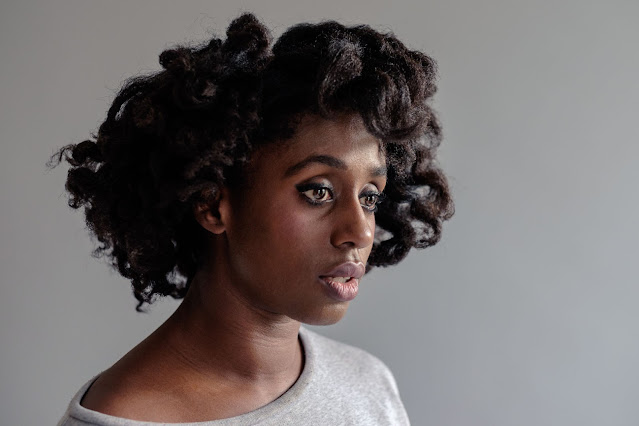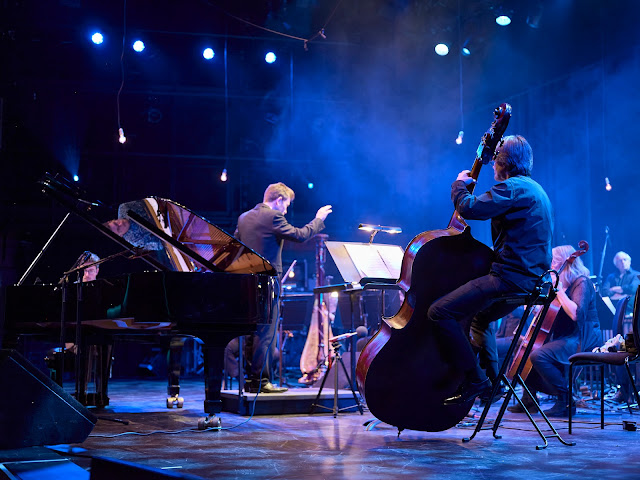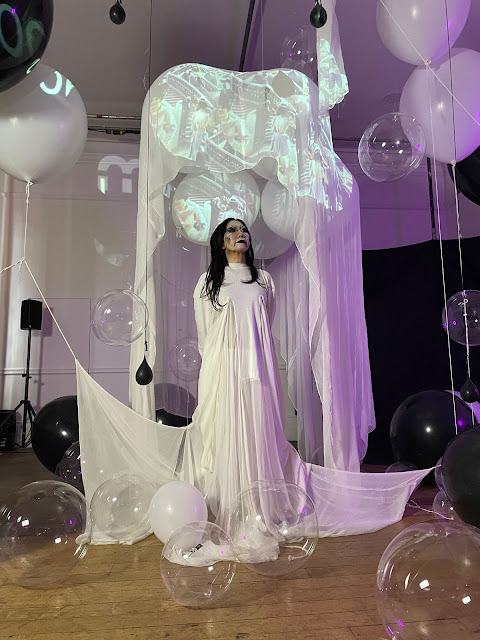 |
| Nwando Ebizie (Photo: Dimitri Djuric) |
London Sinfonietta's Writing the Future scheme offers early-career music creators opportunities to nurture their talents and to develop a new piece. The final instalment of its fourth series of Writing the Future sees multidisciplinary artist Nwando Ebizie turn the traditional concert experience on its head. Nwando's Fall and then Rise on a Soft Winter's Morning premieres on 15 November 2023 at Colour Factory, Hackney Wick when London Sinfonietta is joined by Chisato Minamimura dancer, Nat Sharp art director and Chloe Rooke conductor.
By creating a multisensory and accessible experience, the concert aims to give d/Deaf audiences a fulfilling experience equal to that of hearing audiences, including performed theatrical British Sign Language (BSL), alongside physical elements such as haptic amplifiers, large balloons which the audience will be encouraged to touch in order to feel the vibrations of the music, and a recreation of sound through movement.
Nwando intends the event to be a music experience that broadens out what such performances can mean for D/deaf people. Many love music and experience it in different ways. As a multi-disciplinary Nwando wants to enable people to connect with more than one sense by creating an immersive environment. There will be the music performed by the London Sinfonietta, the text (which she has written) spoken by her and danced BSL to interpret the text. Nwando is a dancer and a composer, she wrote the music to fit with the dance piece. The concert environment also connects to the piece, in the gaps between the music people can explore this.
 |
| London Sinfonietta (Photo: Orlando Gili) |
Her first interest in the project came through thinking about sound, about the different frequencies we can detect and their effect on the body. She is interested in neuroscience and has done projects on visual perception, but she became interested in sonic perception. What happens in the brain when the body detects sound?
During a project a few years ago at Bounce Festival, a disability arts festival, she became interested in in ritual experience and got people to hug balloons, but then found that this introduced a new level of interest for deaf people as they could feel the vibrations of the music. She mentions the band Grateful Dead whose supporters, Dead Heads, include a group Deaf Heads, who experience the music partly through vibrations.
Her own music comes from dreams and feelings, so Fall and then Rise on a Soft Winter's Morning arose from the image of a balloon falling and rising. But the language interests her also, our use of the word falling, falling in love and so forth. The music came out of the confluence of these thoughts.
The more she thought about it, the more she realised that she didn't know anything about the deaf experience. This poverty of understanding led her to want to connect, she became interested in the idea of feeling music through vibrations and did some R&D in the area. But she points out that you can never explain what a perceptual experience is like, and this is something she finds fascinating.
 |
| Nwando Ebizie: Fall and Then Rise - Chisato Minamimura (Photo: Nat Sharp) |
Her work is very much about the act of creation, rather than focusing on a particular area or craft, and she works in different spheres, often over a long term. For a recent exhibition, she learned filmmaking and ceramics. It is normal for her to explore new disciplines, it is exploring the technical elements that she likes, whilst different ideas work for her in different mediums.
Working with Writing the Future has been an ongoing part of this process and integral to the current project. Through them, she was connected with Lee Reynolds who helped her score the piece, and she admits that she wouldn't have been able to get the music notation down so exactly on her own. This was a different way for her to process ideas, as previously she had written either for herself to perform or by creating electronic music.
She hopes that people will come away from the event feeling that they have experienced an amazing piece of music, but she also wants them to be led into another world, a shadow land where their ideas of what music could be are changed.
Looking ahead she is writing a piece for The Hermes Experiment which will be premiered at Cafe OTO next year. She is also working on a big piece, one that she has been working on for a long time. She describes it as an operatic mystery play which will be an immersive, outdoor experience about the life and work of Hildegard of Bingen, which involves creating an apothecary garden that will feature in the show. Next year will also see a new album. Then there is a short film which has been commissioned by Opera North and Sky Arts based around music that she has written.
Her family is Igbo, from Nigeria. She was born there but the family came over to the UK when she was young. The African, Igbo connection is an important part of her heritage and she feels that it influences the way that she works. She tries to reconnect with her heritage, its art, cosmology, ritual and music. The links from Fall and then Rise on a Soft Winter's Morning back to her heritage are there in a roundabout way. People interested in Igbo cultures might recognise the mythology and imagery in her new piece. Whilst some of her other work is linked to her Igbo heritage, the main musical influences in the work are Shostakovich, klezmer classical romantic, there are elements of European folk dance in it. She can't explain why, but it was what she was feeling when she was writing the piece.
Nwando Ebizie: Writing The Future - Turning the traditional concert experience on its head
London Sinfonietta, 15 November 2023, at the Colour Factory, Hackney Wick - further details
Never miss out on future posts by following us
The blog is free, but I'd be delighted if you were to show your appreciation by buying me a coffee.
Elsewhere on this blog
- Never a dull moment: Edward Lambert's Masque of Vengeance, a taut and driven new opera based on Thomas Middleton's 17th-century play, The Revenger's Tragedy - opera review
- Flute explorations: lesser-known Schubert, early Beethoven and the father of Swedish music - record review
- Infinite Refrain: Music of Love's Refuge - Celebrating 17th-century Venice as a place of tolerance for gay artists - record review
- The Monarch's Music: recorded as part of Queen Elizabeth's Platinum Jubilee celebrations and released to serendipitously celebrate the 2023 Coronation - record review
- Cyrillus Kreek: Sacred Folk Tunes - an iconic work by one of the founders of Estonian music recorded by a fine Estonian choir - record review
- Escape to the Country: Rachmaninov at Ivanovka at the London Song Festival with soprano Alexandra Dunaeva & countertenor Iestyn Morris - concert review
- Music knows no borders: countertenor Reginald Mobley on the music of Ignatius Sancho, spirituals as Early Music and the importance of diversity - interview
- An evening of wit, delight and magic: Silent Slapsticks at The Ritzy with Brixton Chamber Orchestra - film review
- The level of polish & perfection is remarkable: Apollo5's Haven - record review
- Engaging & involving: Christophe Rousset & Les Talens Lyriques release Thésée as their 12th Lully opera album - record review
- Home




.jpg)







No comments:
Post a Comment